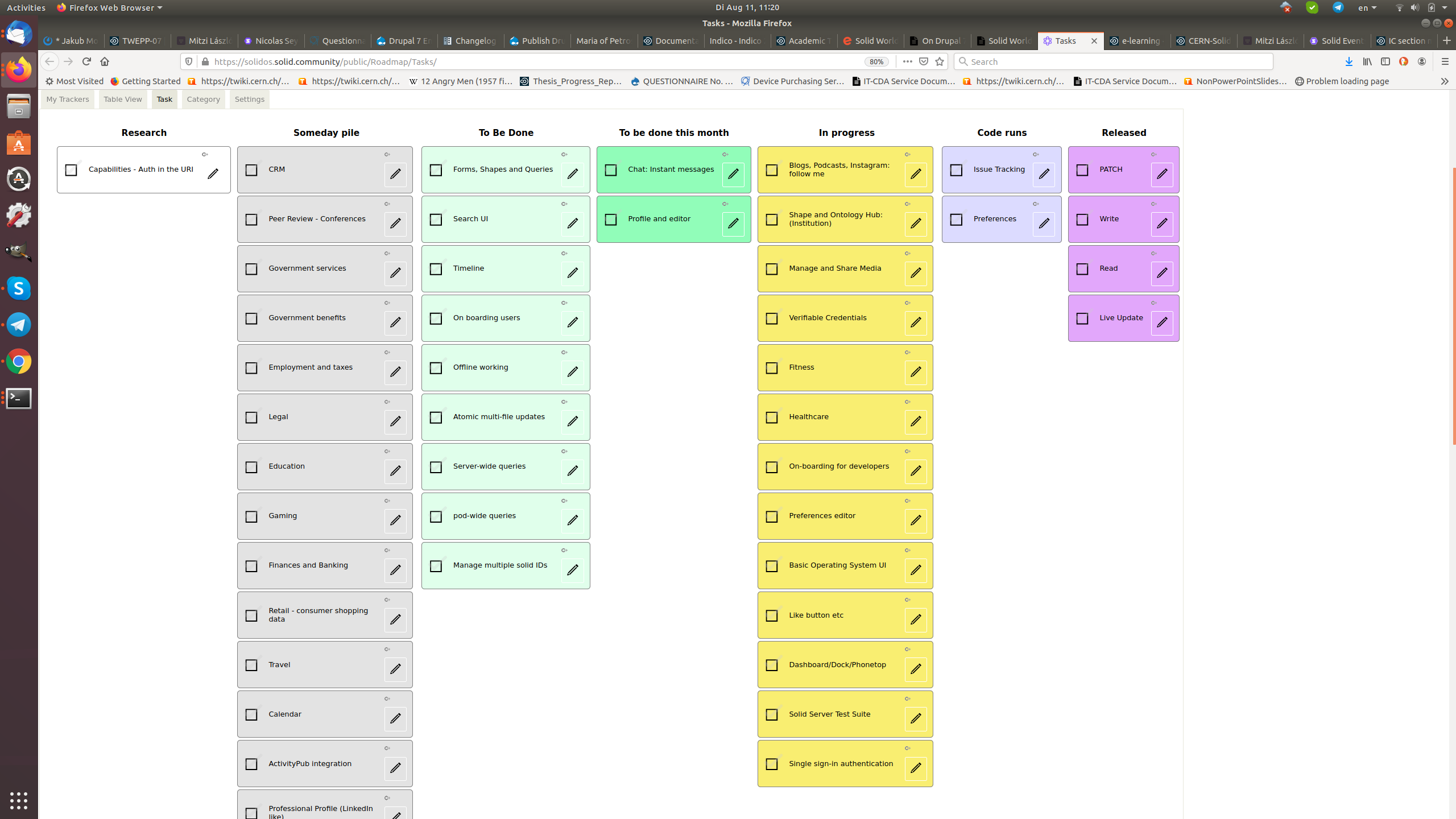Slides on the CERN-Solid collaboration for OSSYM
===
---
## The CERN-Solid collaboration
Presentation at the Open Search SYMposium (OSSYM) 2020/10/12
[Event details](https://indico.cern.ch/event/883268/)
Maria Dimou – CERN-Solid collaboration manager
with contributions from CERN web application developers
and Jan Schill - MSc student [in the CERN-Solid code investigation project](https://it-student-projects.web.cern.ch/projects/cern-solid-code-investigation).
---
## World Wide Web - What happened
* The Web was invented at CERN by [Sir Tim Berners-Lee (TimBL)](https://www.w3.org/People/Berners-Lee/) in 1989.
* He defined it as a **free, open, networked Internet application**.
* The Web produced an uprecedented change to human civilisation.
* 30 years later, the original purpose of the Web "access to knowledge, free for all and respecting each one" is being violated.
* TimBL proposed _Solid_, the open source platform aims to give people control over their data.
---
## The first ten years
* TimBL went to MIT to create the World Wide Web Consortium (W3C) in 1994.
* In the [CERN Web Office](https://weboffice.web.cern.ch/WebOffice/), till 1999 we:
* ran TimBL's httpd - followed by the Apache web server with virtual hosting, on Unix platforms.
* negotiated a free-of-charge Netscape browser support contract.
* deployed _pinaweb_ (Personal Intelligent Newspaper Agent) (a web profile by CERN student Heidi Schuster).
* investigated Web-based calendars
* recommended HyperNews for collaborative work
* and more...
---
### Web Search at CERN
* CERN student Darius Kogut wrote [_Torch_](https://cern.ch/dimou/SApaper.html#torch), a search engine parsing natural english language in 1998.
* This development was an intellectual satisfaction; relationship with other disciplines, the understanding of rich human language by the search engine.
* As the Web was in exponential growth, we couldn't go far with in-house development.
* So we evaluated Lycos and Altavista... they left a lot to desire.
* Finally we signed a negligeable-charge contract with _Infoseek_, then _Inktomi_. [Slides from 1999](https://cern.ch/dimou/SAslides/searchcriteria.html)
---
### Web Search in general
* Search was "innocent" at the time;
* companies didn't make money out of offering, withholding, manipulating information on the web.
* Google didn't exist yet.
* The search results were irrelevant or incomplete, still they were what existed and not what the engine would like to show the user.
* Surveillance and intrusion were not yet terms we were conscious of.
---
### CERN & Web standardisation since the year 2000
* Computing focus at CERN was turned to the huge amount of data produced at the LHC.
* Proposals for a CERN-W3C collaboration remained without answer for 25 years. The suggestions were:
* to combine use of the https protocol for physics' data transfer and remote access to storage with W3C standardisation work. [Details](https://cern.ch/dimou/personal/CERN-W3C_Collaboration.pdf).
* to contribute design concepts in CERN applications in areas like the Data Catalogue Vocabulary, cross-service inter-operability and Authentication/Authorisation rules and restrictions. [Details](https://cern.ch/dimou/personal/CERN-W3C_Collaboration_2017_proposal.pdf).
* Things seem better now.
---
### Solid - What is
* TimBL announced the Solid project (Social Linked Data) in 2016, aiming to give people control over their data. His summary:
* This is an open source platform, adding standards never put into the original web spec, including:
* Global single sign-on,
* Universal access control
* A universal data API so that any app can store data in any storage place.
* Socially, Solid is a movement towards a world in which users are in control, and empowered by large amounts of data, private, shared, and public.
---
### CERN-Solid collaboration - born this year 2020.
CERN packages relevant to Solid spec's for evaluation:
* The CERN _push notifications_, unilateral, via subscription and archived.
* _Indico_, an event management open source platform, with 20 years of operational status.
* _CS3MESH_, a pan-European cross-institution mesh that will offer data sharing/co-editing facilities, relying on the federation of different sites by using well-known APIs.
* _InvenioRDM_, a Research Data Management, open source platform for persistent registration of research papers and data.
* _The new CERN Authentication_ project.
Web pages of the above in the "References" at the end.
---
### Activities now
MSc student Jan Schill from https://itu.dk started working on [this project](https://it-student-projects.web.cern.ch/projects/cern-solid-code-investigation). Goals include:
1. understanding which Solid specifications are ready and clear.
2. evaluating the first Solid implementations.
3. making a recommendation to the CERN open source applications on Solid adoption (or not).
4. exploring Indico, to test the Solid principles, by:
* modifying-ala-Solid the _Indico registration form_ module, so that registration data belong to the user and not to Indico.
* enriching _Indico meeting_ pages with Solid-based content, such as comments.
Indico-related suggestions by TimBL and [Pedro Ferreira](https://www.linkedin.com/in/pferreir/).
---
### Search-related work in Solid
* In Solid, data is stored in [Pods](https://solidproject.org/faqs#pod).
* Current and planned work in Solid includes:
1. The 'Search UI' item in TimBL's roadmap (next slide) - client-side interface, for searching in one's own pod.
2. Server-side pod-wide search functionality by Fred Gibson for the TrinPod implementation of a Solid server.
3. Solid-user-search for searching a person (like in a phonebook)
4. hashtag-search, for content that is related to a given hashtag.
For design details and development status contact [Michiel de Jong](https://michielbdejong.com/).
---
### Solid (evolving) roadmap

---
## References I
[1] The original Web proposal https://www.w3.org/History/1989/proposal.html
[2] The CERN-Solid Indico category https://indico.cern.ch/category/11962/
[3] The Solid project web site https://solidproject.org
[4] The CERN Web Office (most data missing today) https://weboffice.web.cern.ch/WebOffice/
[5] The CERN Torch search engine http://cern.ch/dimou/SApaper.html#torch
[6] CERN-W3C 2014 proposal https://cern.ch/dimou/personal/CERN-W3C_Collaboration.pdf
[7] CERN-W3C 2017 proposal https://cern.ch/dimou/personal/CERN-W3C_Collaboration_2017_proposal.pdf
---
## References II
[8] Push notifications archaeology - proposal in 2003 https://cern.ch/dimou/it-us/zephyr.shtml
[9] Push notification proposal in 2020 https://codimd.web.cern.ch/p/ry5_j4r2U#/
[10] Linked Data Notifications: https://www.w3.org/TR/ldn/
[11] The WebSocket Protocol: https://tools.ietf.org/html/rfc6455
[12] Indico https://getindico.io/
[13] The Road to the new CERN Identification https://auth.docs.cern.ch/whitepapers/the-road-to-new-auth/
[14] CS3 MESH https://silo2.sciencedata.dk/sites/cs3mesh4eosc/
[15] InvenioRDM https://inveniosoftware.org/